Rome’s bar and nightlife scene may not be as vast as the scene in New York City or London, but it’s grown a lot over the last 25 years, thanks in part to Massimo D’Addezio. Industry insiders know Massimo as one of the city’s OG bartending legends who always strives for excellence both, behind the stick and when it comes to service. During his tenure, the Stravinskij Bar at the Hotel de Russie became the place to go for top-notch cocktails in a beautiful environment with warm, friendly staff. Nowadays, you’ll find him at Chorus Café, which he opened in 2015.
I don’t know why Chorus often gets left off of lists of the best bars in Rome, but in a selfish way, I’m kind of glad that it does. It’s sort of like a speakeasy, but not a gimmicky New York-style speakeasy like the Jerry Thomas Project. It’s just tucked out of the way on the second floor of the Auditorium della Conciliazione near the Vatican, an area where you’d never expect to find one of the best bars in Rome.
Make the effort to go there and you’ll find yourself in an elegant space with soaring ceilings, 1930s rationalist architecture, marble on the walls, and plush sofas and chairs, plus DJ sets on the weekends. I always order the Japanese 75, Massimo’s take on a French 75 with yuzu instead of lemon. When you go for an aperitivo, the cocktails come with tasty snacks, but there’s also a full menu by Chef Arcangelo Dandini if you’re hungry for something more substantial.
I recently stopped by for drinks and bites with a friend visiting from the U.S. and had a chance to catch up with Massimo. I’m thrilled to share this interview with him for my series of interviews with creatives and entrepreneurs doing cool things in Italy.
So, Massimo, I read that you were born in Canada...
I was born on a trip to Italy while my parents lived in Canada, so I brushed up against it and I always made my father feel guilty about it because I would have had two passports.
Your family is also involved in the world of hospitality, no?
Yes, my parents—above all my dad—were restaurateurs since 1950, when they opened their first trattoria near Termini Station and then they moved to this new neighborhood, Centocelle, which became their base of operations. They opened these places and my dad was always involved. He always had a passion for this profession.
Do they still have any restaurants?
No, their last adventure finished in ‘87 and then my dad retired. I slowly got involved in this world by chance. I was the neighborhood barista when I was a kid and wanted to earn money to buy tickets for the soccer games on Sundays. I brought coffee to the neighbors. Then I did street theater and in the theater group, there was this girl whose father was an important sommelier, who said to me, “Seeing as you have this propensity, why don’t you study?” and he brought me to take classes to become a sommelier.
During the course, I met one of my teachers, who encouraged me to take bartending classes. This was in ‘94, ‘95. So I started to study the subject and really fell in love with this career. I had hospitality in my DNA and then I started to turn it into a real profession. Every time I had a bit of money in my pocket, I went to London to buy books and see what was happening in the bars. Because we’re talking about a time when there was no internet—it didn’t exist. So if you wanted to know about something, you had to see it with your own eyes or buy books.
Did you ever work as a sommelier?
No, I never worked as a sommelier in a restaurant. Let’s say it was a trampoline because then I was completely taken with the world of bartending.
I was going to ask you how you made the jump from wine to cocktails, but you were saying you were inspired by London...
Yes, I had the luck to be able to live in a world that doesn't exist anymore. Now I’ll tell you what I mean. Sometimes, on Sunday evenings in the ‘80s, my aunts and uncles brought me to have tea at the Hilton and it was a big salon where there was a certain kind of world. I was little, but I was fascinated by the elegance that was all around me. This makes me smile because when you enter into the working world, you see it another way.
I lived the elegance of service, which today has been lost. Young students today don’t have the possibility of living luxury. For me it was really a luxury to have that kind of experience and I tried to recreate it in my life. Today the value of luxury has been lost. Luxury has its own kind of beauty. Rich or poor, everyone wants beauty and sometimes one must give it to oneself. One has to make sacrifices, one has to appreciate it. Unfortunately, young students have lost this and they’ve lost the meaning of this profession.
Let’s talk for a minute about luxury and hotels because then you started working at the Hotel de Russie. You were on the opening team of the Stravinskij Bar. Back then, what was the bar scene like in Rome?
It didn’t exist. There were four historic bars where the important bartenders worked: the bar of the Hotel Inghilterra, il Baretto, which was a bar on the street, then there was the Excelsior, and the St. Regis, which at the time was the Grand Hotel. These were the four big hotspots. Then there was the bar of the Eden, where there was a certain kind of luxury and ambiance. But these were the most important bars. I hope I didn’t forget anyone, but these were the ones that I experienced as mythic places.
And then at the Hotel de Russie, you created that long list of Martinis, didn’t you?
I entered the de Russie because Leonardo Temperini, who was the right hand man of Mauro Lotti, was called to open this little urban boutique hotel. When I went, I was supposed to be one of the bartenders, and you have to consider that in the garden, they said, “Oh here we’ll put four tables for people who want to smoke.” So everything was supposed to happen inside the bar.
We were a lucky team because there were six of us, led by Leonardo, who had all the intuition. He was the inventor of the Stravinskij Bar. He understood the key. I did nothing but continue when Leonardo was promoted to Food and Beverage Manager and another colleague decided to go live in Milan and within two years, I became Head Bartender and then Bar Manager, when the big difference between them was that the Bar Manager was the person through whose hands the numbers passed.
I had the intuition to put all the tables outside because when the General Manager, a very British man, asked me, “Massimo, what’s your project that you want to do here?” I said, “We’re in Rome, Rome needs outdoor dining. Let’s put tables outside.” Then looking around at the clients, I intuited that they wanted to have elegant but warm service. So in contrast to what the company told us, which was to have the service be British—a bit cold and reserved—we created a homey atmosphere.
It became a sort of members club without a fee, but people came because they trusted us. The beautiful thing is that the children of clients who came in 2000, 2002, 2003 still go to drink there, even if I’m no longer there. The de Russie was born in this way.
So why did you leave the Hotel de Russie?
I left because at a certain point, it became too complicated. The de Russie wanted too much and gave back too little to me, on an energetic level.
This was in...
2013. I believed in that place and when I wanted to take the next step, I spoke with Sir Rocco Forte and he didn’t support my vision, so I peacefully left. I don’t believe in the system of unions and vindications. I believe in my own amusement. I’m a person who wants to have fun with my work because it’s a creative job full of color, imagination, and energy. So I left. They asked me to try again, but I understood that the relationship was over. The thing that makes me smile is that they did the project I presented to Sir Rocco Forte ten years later.
They took their time!
They took their time, but I’m glad to see that the concept I envisioned for that place worked in the end. I’ll take it as a consolation prize.
So then you opened Co.So, right?
We opened Co.So as a sort of flagship store for consulting projects for bars that wanted to open. And it worked. Because out of that came Chorus. After conceptualizing it, I was asked to remain there to manage it. So I stayed.
And Chorus opened in...?
2015.
Almost ten years ago.
Ten years ago. This is the tenth season.
Will you do something to celebrate?
We’re trying to organize an event for January 13, for the anniversary.
I’m curious: how did you find this space? Because in my opinion, this is a hidden gem in Rome.
A guy who worked with me was called to be the bar manager here, and seeing as we did consulting, one of the services we offered was designing bar counters. So Valentino Longo, who has become a mythic person in the international bartending community and has a bar in Miami, called me and asked me to do a walk through because they had to build a bar.
The bar was supposed to be under the statue of the pope, two meters long. I came in for a site inspection with various people, and I said to the person next to me, “These people are crazy to open another restaurant in Rome. I would put a bar here, with a huge counter and a DJ.” And that’s what happened. Because the next day he called me and said he’d like to elaborate on the idea. They liked my concept, so we went ahead.
Do you consider Chorus a bar or a restaurant?
Both. It’s a meeting place, a bar, a restaurant, a club. It’s everything. It’s what was missing in Rome.
It’s what’s still missing in Rome!
We have to remain a place for the few in-the-know people.
So what was the biggest challenge when you opened Chorus? And what’s the biggest reward?
The biggest challenge was that for the first time, after the de Russie, I was putting my name on everything—on the bar, on the bottle selection, on the menu—and this was a project that had to succeed, so that was the challenge. And the reward is that it worked. It’s been ten years and we’re still here. We made this place grow and we’re still here despite everything that’s happened.
To wrap up, would you share two or three places where you like to drink and eat in Rome?
Absolutely. For drinks, Drink Kong by Patrick Pistolesi, L’Orum Club at the Excelsior, where there are fantastic bartenders. So new school: Patrick Pistolesi; old school: Orum. And Rude in Centocelle. These are the three places I like to go. For Roman cuisine, my home. I like to stay home and cook with my wife.
Further Reading
Want to know where else to drink in Rome? Check out my very subjective list of the best bars in Rome and my very subjective list of the best rooftop bars in Rome.
You can learn more about Chorus, see the menus, and book a table on the official website.
When I was tasked with updating Fodor’s Rome guidebook, one of the first places I added was Chorus. You can see the online listing here and pre-order the 2025 edition of the book on Amazon.
You can see all the interviews in this series here.


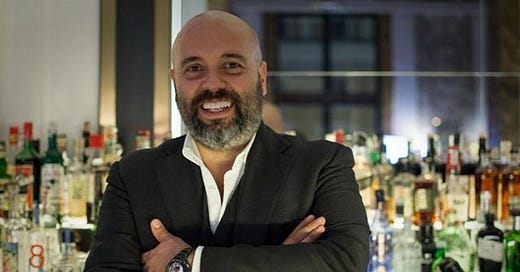




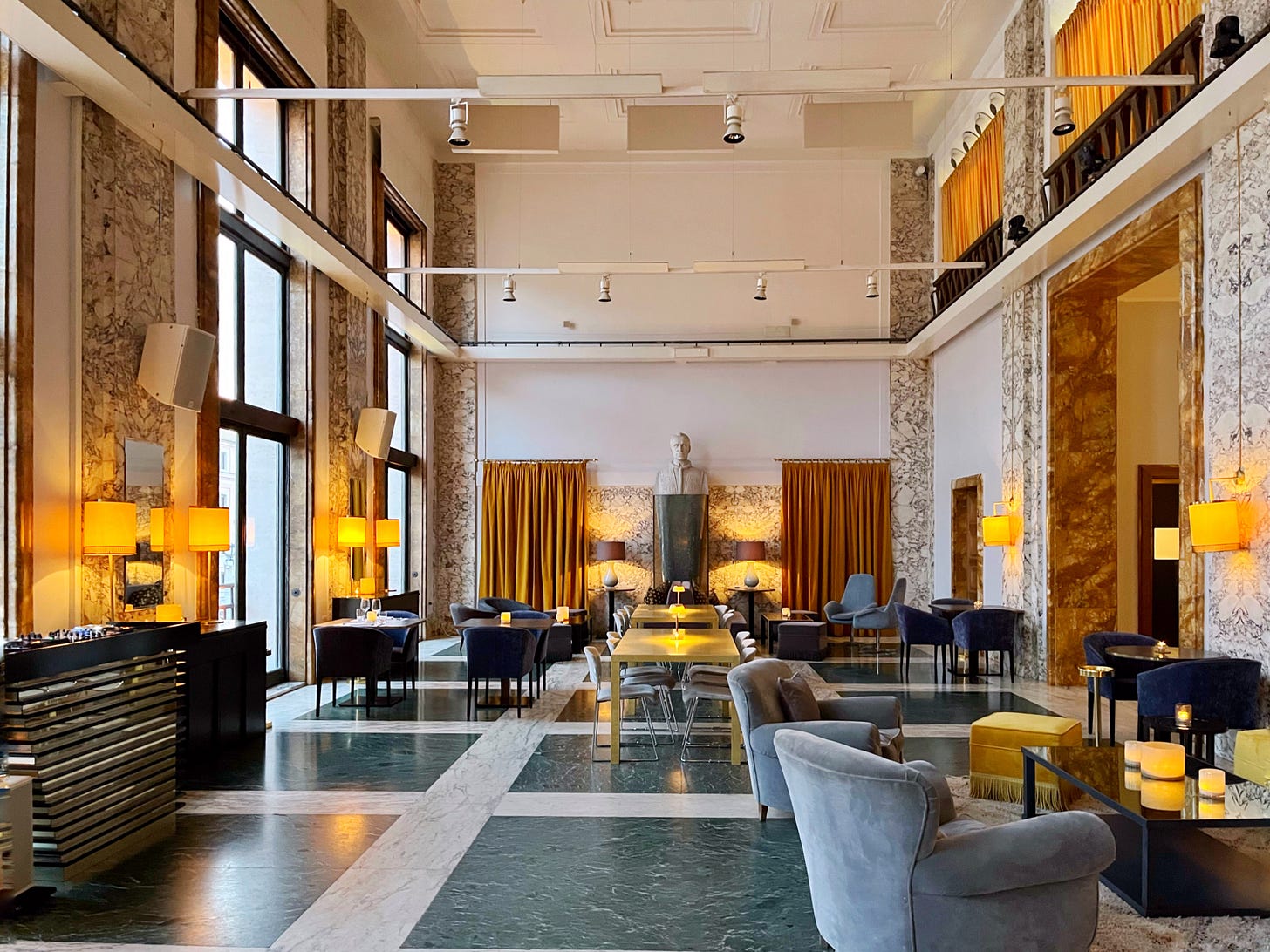
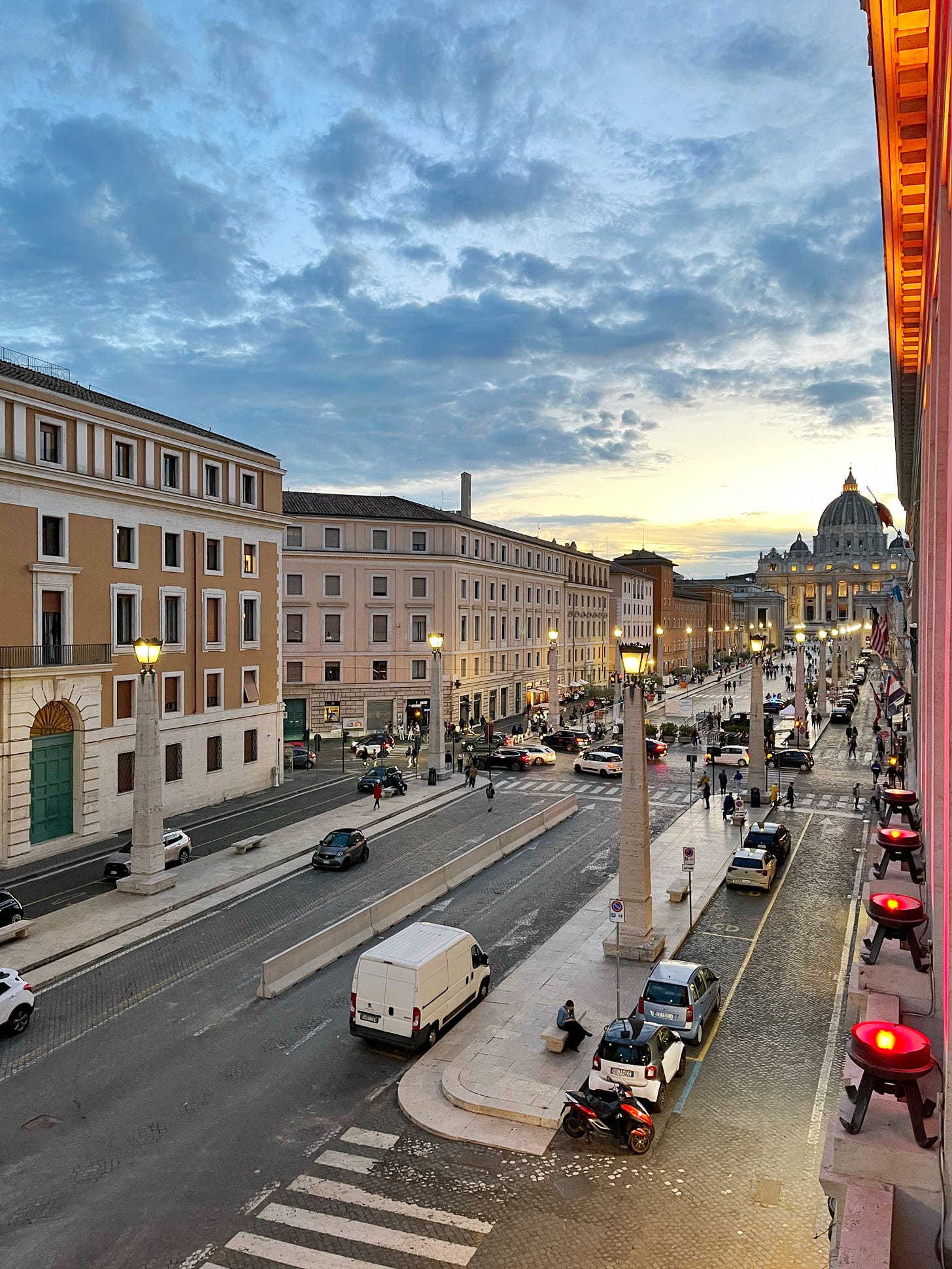
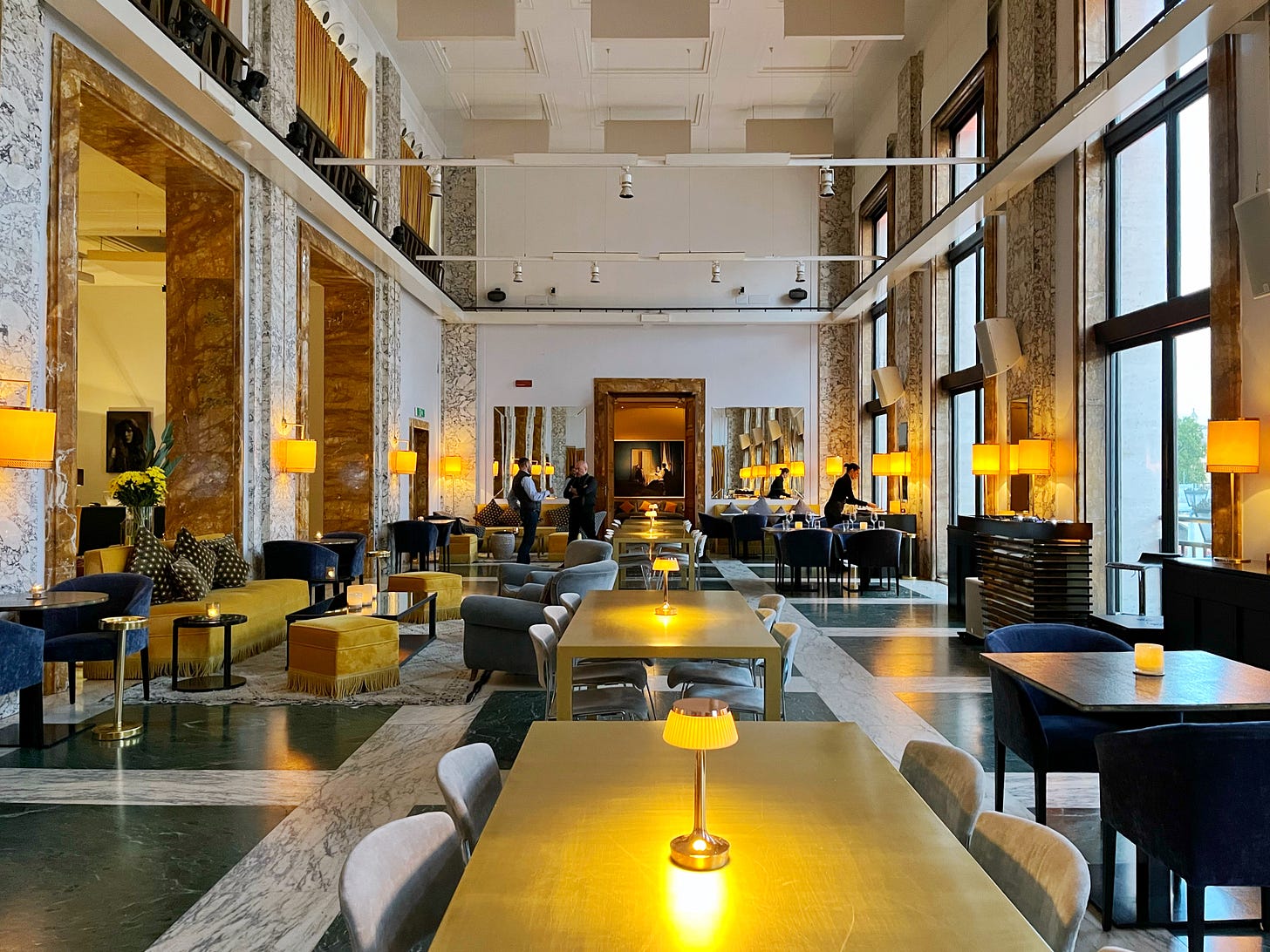
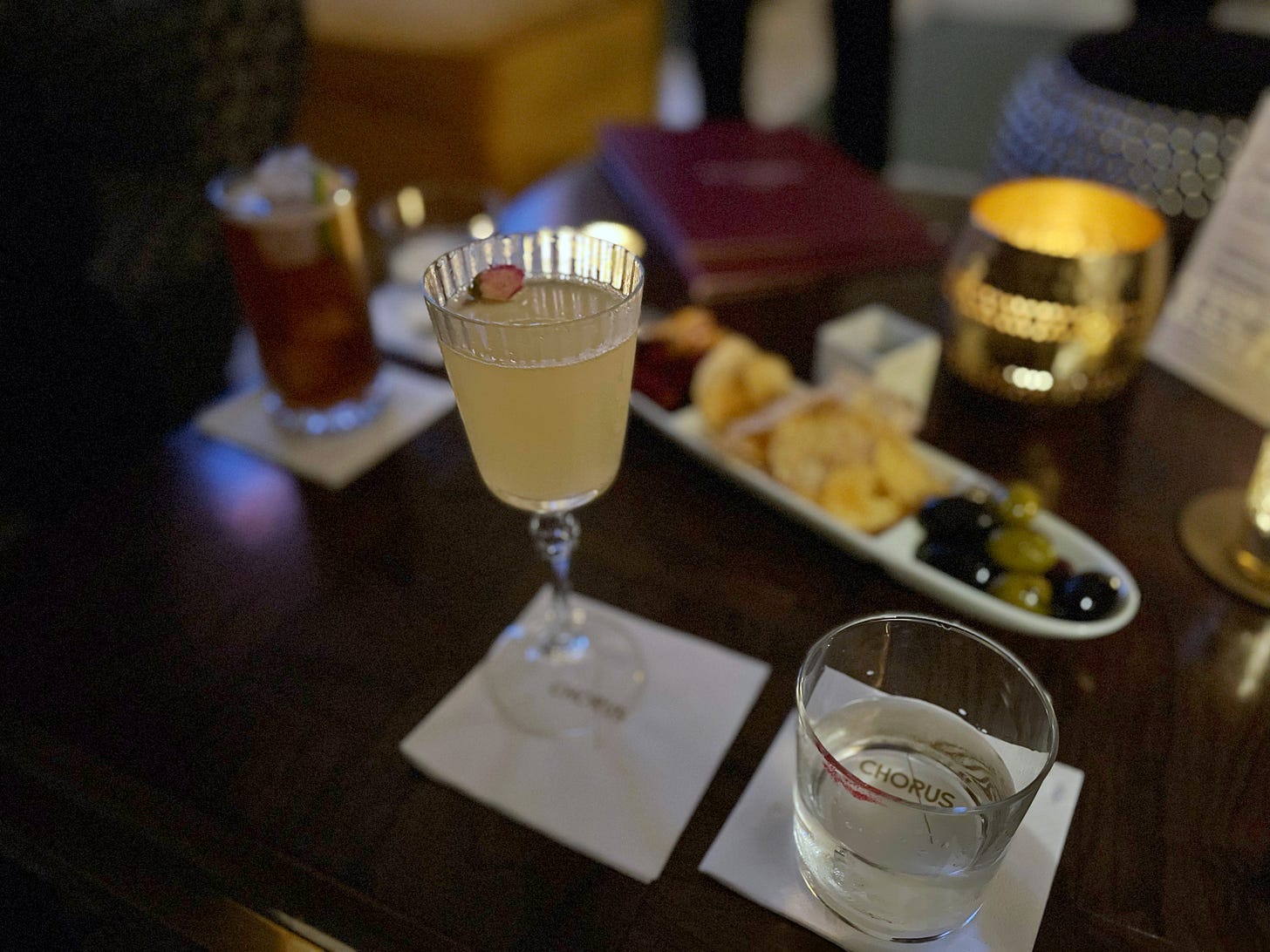
Packing the linen suit for that one! Looks amazing
Chorus looks so glamourous!